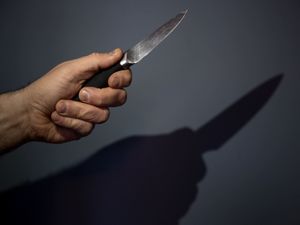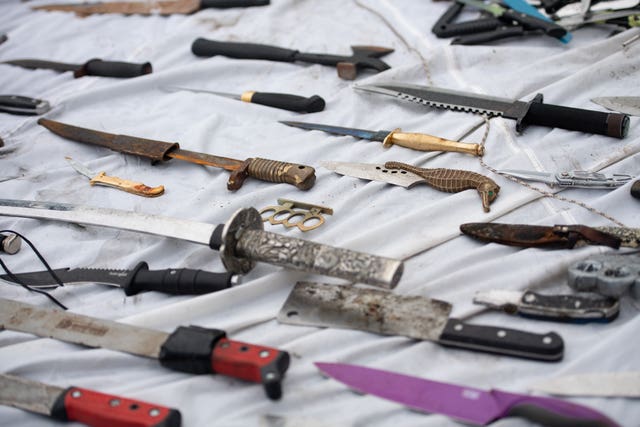Rounded blades ‘safer alternative’ to pointed kitchen knives, research suggests
The preliminary findings comes as round-edged kitchen knives are being advocated as an alternative to pointed blades to help tackle knife crime.

Rounded blades are safer alternatives to sharp-pointed kitchen knives that could reduce injuries and save lives in a bid to tackle knife crime, new research suggests.
A fresh study that tested 1,200 repeated stabbing motions on everyday clothing such as cotton t-shirts and denim jeans found that 10 different round-ended knives did not cut through the fabric at all, compared to two sharp-pointed knives that did.
De Montfort University’s forensic scientist Leisa Nichols-Drew, who is leading the research, said the preliminary findings support her previous work published in 2020 which was the first to look at the connection between the shape of the tip of a blade and clothing damage.
The associate professor told the PA news agency: “The reason being, they act as a barrier. People wear their clothing, and then if that’s penetrated, then obviously there’s a risk to someone being injured, either accidentally, in the home, for example, or in a violent incident.
“Any kitchen blade has a sharp cutting edge because that’s what they’re designed to do as kitchen tools, but, from my experience, from the cases that I’ve seen, and looking at the clothing that’s been damaged, the greatest harm is from a sharp force trauma.”
Ms Nichols-Drew, who works with violence reduction units across the country and is a member of the national knife crime working group, said the “promising” results are currently being validated before it will be submitted for publication and to be peer reviewed imminently.
The chartered forensic practitioner told PA: “There are these safer alternative knives out there, and our ultimate goal is to reduce injuries, minimise harm and save lives.”
The early research findings come as the Home Office announced a raft of anti-knife crime plans on Wednesday, including making retailers report bulk or suspicious sales to police, and increasing the jail sentence for selling weapons to children, or illegal blades such as zombie knives, to two years.
The Home Secretary Yvette Cooper previously told The Times that a ban on kitchen knives with a pointed end was being considered in a bid to tackle knife crime, as actor and campaigner Idris Elba has suggested not all domestic blades need to have a point on them.
The move was not included among the measures on Wednesday.
Asked about rounded knives by PA, Ms Cooper said it is one of the things being looked at as part of the task force set up after the election.
She added: “But the action that we’re setting out now as part of a new law, new crime and policing Bill, will be about clamping down on the online knife sales that are putting these lethal weapons into the hands of children.”
Policing minister Dame Diana Johnson said “nothing is off the table” regarding measures to tackle knife crime.
She told BBC Radio 4’s Today programme: “I’ve already had meetings, actually, with academics, with a surgeon and with a judge to discuss what that actual proposal would mean, so we are actively looking at that.”
Latest figures published by the Office of National Statistics show that of the 262 homicides by a sharp instrument in 2023/24, 109 (42%) involved a kitchen knife, representing the most commonly used blade from the data.
Ms Nichols-Drew said her latest research gives an evidence base supporting what Elba has proposed, as she is also working with a group of experts to advocate for safer knives.
“It’s a safer mechanism to have these safer round-ended knives, they will still have the utility function that you’d want from a kitchen tool,” she said.
“Hopefully we can prevent sharp force trauma, penetrating damage, and hopefully we can reduce injuries and ultimately fatalities.”
The forensic expert recommended looking at ways to prevent knife injuries in the first place after conducting a fellowship in Australia and Canada to investigate how they approach knife crime offences and to aid the UK response in 2018.

She added that in the latest research over the last year, more round-ended knives were used as there are more manufacturers making them as safer alternatives to kitchen knives compared to her initial research five years ago.
While only clothing was used for stab tests in the previous study, this time the fabrics were layered onto materials such as ballistic gels to create a realistic scenario of a human body to test the stabbing motions.
The research was led by De Montfort University in collaboration with University of Leicester, Northumbria University and Teesside University.
In advocating safer knives, Ms Nichols-Drew said that while there are pointed knives already out there, the public may consider changing this perception over time such as when seat belts and air bags were introduced to cars and became “the norm” in vehicle safety.
The forensic scientist also suggested round-edged knives could be used in settings such as houses of multiple occupancies, schools, care homes and other residential sites such as prisons.
“I’d like to think that we can safeguard people in institutional settings. I think that’s of paramount importance first and foremost,” she said.
Ms Nichols-Drew is working with experts across a number of fields as part of a Safer Knives Group, which includes chair of the Justice Select Committee and MP Andy Slaughter.
The group said while it is right for the Government to prioritise tackling knife crime with measures such as banning machetes and zombie-style knives and tightening online sales regulations, they will not be alone enough to meet their bid to halve knife crime in a decade.
The Safer Knives Group is advocating to phase out pointed-tip kitchen knives as the industry standard and introducing the safer alternative as the norm, as part of the solution to counter knife crime, but also as a factor in self-harm and suicide.
Other recommendations include introducing a pricing levy to discourage buying pointed knives, and services to grind down existing blades at supermarkets, high-street key cutters and police stations.
The group added: “Knife crime is a complex and multi-faceted issue—there is no single solution. However, these measures represent practical steps that align with the Government’s commitment to halving knife crime and reducing preventable deaths.
“Making safer kitchen knives the norm, rather than the exception, is a realistic, evidence-based intervention that will save lives without restricting legitimate knife use.”





